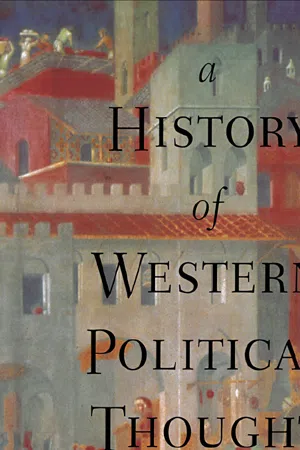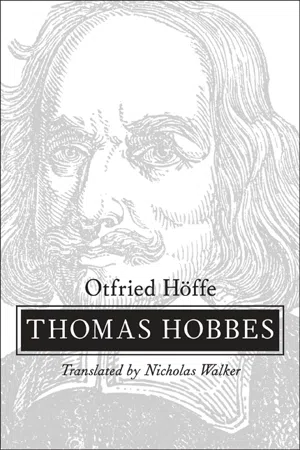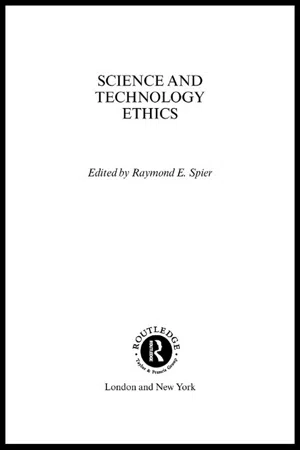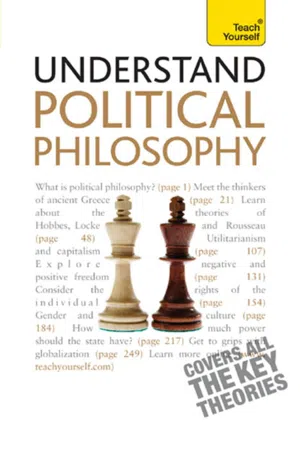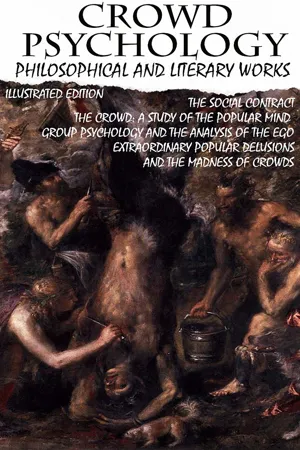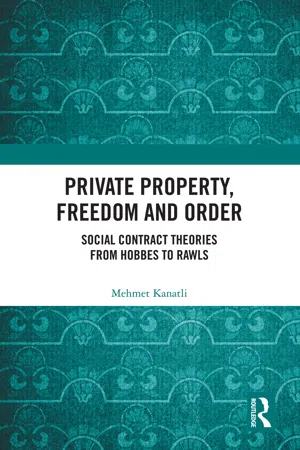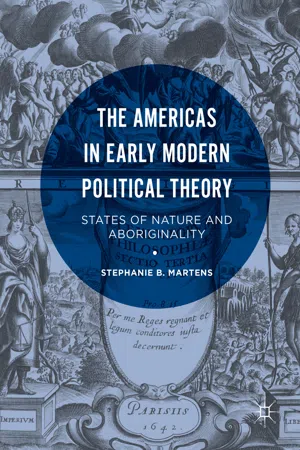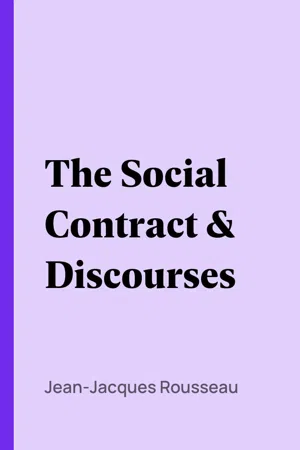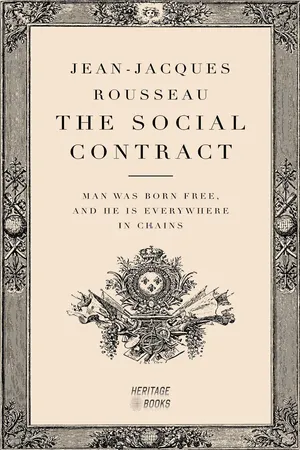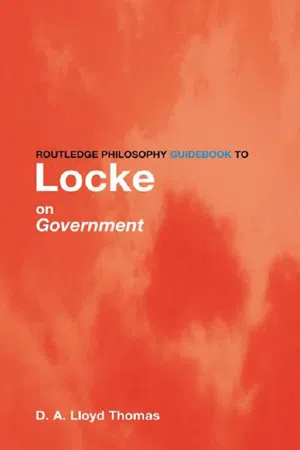History
Thomas Hobbes and Social Contract
Thomas Hobbes was a 17th-century philosopher who proposed the concept of the social contract in his work "Leviathan." He argued that in a state of nature, humans are self-interested and competitive, leading to a "war of all against all." To escape this, individuals enter into a social contract, surrendering some freedoms to a sovereign authority in exchange for security and order.
Written by Perlego with AI-assistance
Related key terms
12 Key excerpts on "Thomas Hobbes and Social Contract"
- eBook - ePub
- J. S. McClelland, Dr J S Mcclelland(Authors)
- 2005(Publication Date)
- Routledge(Publisher)
Social contract theory in one form or another lasted from about the middle of the sixteenth century to the middle of the eighteenth century, which is a very good record for a style of political argument. Shorn of its grander pretensions, the theory has never died. The question: What would we do if we had to start society and the state all over again? has continued to be asked as a guide to the future actions of government.Notes on Sources
Social contract theory cries out to be understood in the context of religion and the rise of capitalism in Max Weber’s and Tawney’s sense. The surest short-cut to this understanding is C.B. Macpherson’s outstanding The Political Theory of Possessive Individualism_ From Hobbes to Locke (1962).Passage contains an image
11 Social Contract I
The Hobbesian version DOI: 10.4324/9780203980743-11THOMAS HOBBESHobbes was born prematurely in 1588, his mother’s labour, it is said, being brought on by news of the Armada (‘Hobbes and Fear were born twins’), but he survived all the vicissitudes of seventeenth-century English politics to die in his bed at the age of ninety-one in 1679. Hobbes was an Oxford man (Magdalen Hall) who found the prevailing Aristotelian-Scholastic philosophy little to his taste. He was recommended as tutor to the Cavendish who became the second Duke of Devonshire. He spent most of his life in the houses of noblemen. He discovered the new science on the Grand Tour in 1610, and in the early 1620s he became the friend and amanuensis of Francis Bacon. Hobbes was a staunch Royalist. By 1641, when he fled to France to escape the coming Civil War, he had met Galileo and many of the most noted scientists and men of letters of his day.Hobbes spent some of his time in exile in France (1641–51) as mathematics tutor to the future Charles II. He also worked on Leviathan, which was published in London on Hobbes’s return to England to make his peace with the Commonwealth. There is some mystery about why he actually came back when he did, though the probability is a combination of homesickness and his growing reputation in émigré - eBook - ePub
- Otfried Höffe, Nicholas Walker(Authors)
- 2015(Publication Date)
- SUNY Press(Publisher)
He recognized the direct relationship between this novel theme and all of these challenges: in methodological terms, the exemplary character of science and of mathematics as the ideal of rigorous demonstration (“reason is reckoning”); in political terms, the bloody reality of civil war and religious conflict, along with the crisis of received moral convictions and religious beliefs. It is in this context that Hobbes introduced the idea of the “covenant”—the theoretical model of the social contract that is typically mobilized by modern political thought against all established usage and tradition—and thereby also created one of the most important philosophical theories of the state and the nature of political authority in the history of Western thought. Some of the peculiar features, or perhaps even incoherencies, of this philosophy can be explained by reference to the social and economic conditions of the time, and the transition from a feudal to a bourgeois social order. These new conditions can be roughly characterized in terms of the market society of early modern capitalism and the possessive individualism associated with it. Jean-Jacques Rousseau already drew attention to such developments in his Discourse on the Origin and Foundation of Inequality among Men (1755), and they have been specifically analyzed and investigated by Franz Borkenau (1934), a thinker close to the Frankfurt Institute of Social Research, and more recently by C. B. Macpherson (1962). Hobbes himself, on the other hand, ascribed little or no significance to social and economic developments as such, and one looks in vain in his writings for any incipient contributions to a general theory of economic life or social development. The all-defining political experience for Hobbes was the civil wars of the time, or rather simply the English Civil War - eBook - ePub
- Raymond E. E.Spier(Author)
- 2003(Publication Date)
- Routledge(Publisher)
But it was radical in trying to locate the duties of subjects and the legitimate powers of sovereigns not by reference to Scripture or tradition or history, but by appeal to the prudential reasoning of self-interested individuals concerned above all with their own preservation and, perhaps, salvation. So for Hobbes society was contractual, in the sense that men might be understood to have contracted to bring it into existence, and the contract was social in the sense that society existed by virtue of each man’s undertaking to subject himself to one common ruler. The sovereign, having been authorized to act on behalf of each, represented in his own person a unity which disparate individuals could not otherwise possess. 15 The answers to the question ‘on what terms would you (a rational self-interested prudential individual) be prepared to enter society?’, and to the question ‘on what terms would you (similarly identified) be prepared to live in political subjection?’, were in this sense one and the same. John Locke’s thought approaches the social contract in a different way. For Locke, men would be capable of a social life in the absence of the state – or of ‘civil society’. 16 Although it is controversial just how extensive the institutions of that acephalous condition were, 17 and although there is some ambiguity about the extent to which they would be capable of obeying the (God-given) law of nature without government, Locke clearly conceived them to be living in a recognizably social condition (but one lacking a positive legal system) in a way rejected by Hobbes. 18 The law of nature regulated the emergence of private property from the common state in which God had given it to Man, and individuals entered political society to protect their property - eBook - ePub
- Mel Thompson(Author)
- 2010(Publication Date)
- Teach Yourself(Publisher)
contractarianism – in other words, the attempt to find a rational justification for the modern nation-state, based on the agreement of the people. This period set the foundations of modern democracy and liberalism – and thus forms the basis of modern political thought.Key questions to ask about representation and consent are:- Does this government represent me fairly?
- How do I give (or withhold) my consent for it to act in my name?
- Am I considered to have given my consent to a nation’s political system simply by being born there? If not, at what point am I asked for my consent?
- What if I belong to a minority and all political decisions are made in favour of the majority? Does that mean that I will never be treated fairly (from my perspective) in a democratic system?
Today, most people favour some form of democracy – that people should agree together to support a government, rather than having one imposed on them. That has come about, to a considerable extent, through the work of thinkers who supported the idea of a social contract – including Hobbes, Locke and Rousseau.Hobbes: an alternative to chaos
When a nation restricts civil liberties or the free-flow of information in the name of security, when it become defensive, when it insists on maintaining tight border controls to defend itself against terrorist threats or illegal immigrants, or when it claims absolute authority, it follows a line of reasoning that goes back to Thomas Hobbes (1588–1679).Hobbes wrote at the time of political conflict – the civil war in England, the challenge to royal authority, the execution of Charles I and the setting up of the Commonwealth. Hobbes favoured the monarchy, and was forced to flee to France in 1640. His best-known work, Leviathan - eBook - ePub
Ethics
The Fundamentals
- Julia Driver(Author)
- 2013(Publication Date)
- Wiley-Blackwell(Publisher)
Chapter 6
Social Contract Theory
Where there is no common Power there is no Law: where no Law, no Injustice. Force, and Fraud, are in warre the two Cardinall vertues.Thomas Hobbes, Leviathan 1With the failure of divine command theory and the lack of uniform assurance that the will of God could provide a basis for morality (or that, even if it could in theory, the practical problems surrounding which interpretation of God’s will to endorse posed too many practical difficulties), alternative theories came to be adopted that focused on the connection between morality and its function as a regulator of human interaction. Utilitarianism and Kantian ethics both provided secular alternatives, but there are other alternatives as well, and social contract theory provides just such a theory.Many people restrict social contract theory to political philosophy and discuss it merely as an account of the source of political obligation and political authority. However, we can also discuss it as an account of morality itself – this theory, then, would roughly hold that moral rules are a matter of agreement between rational individuals, and that agreement is the source of their authority over our actions. Thus the basis for morality would be a kind of contract.Recall that Thomas Hobbes (1588–1679) was a philosopher who believed that human beings were motivated by self-interest. For this reason, as we discussed in Chapter 2, most philosophers regard him as a psychological egoist. Hobbes was also a contractarian, who based his political and social philosophy on his theory of human nature. So some forms of contractarianism are not incompatible with descriptive egoism at all. It is precisely because human beings are self-interested that they will agree to abide by codes of conduct. Failure to have such an agreement would lead to social chaos, which harms the interests of everybody. - eBook - ePub
Crowd psychology. Philosophical and Literary Works. Illustrated Edition
The Social Contract, The Crowd: A Study of the Popular Mind, Group Psychology and The Analysis of the Ego, Extraordinary Popular Delusions and the Madness of Crowds
- Jean-Jacques Rousseau, Gustave Le Bon, Sigmund Freud, Charles Mackay, Wilfred Trotter, Everett Dean Martin, G. D. H. Cole, James Strachey(Authors)
- 2023(Publication Date)
- Strelbytskyy Multimedia Publishing(Publisher)
The second theory, in its ordinary form, expresses only the view that the people is everywhere Sovereign, and that, in the phrase of Milton's treatise, "the power of kings and magistrates is only derivative." Before, however, this view had been worked up into a philosophical theory, it had already been used by Hobbes to support precisely opposite principles. Hobbes agrees that the original contract is one between all the individuals composing the State, and that the government is no party to it; but he regards the people as agreeing, not merely to form a State, but to invest a certain person or certain persons with the government of it. He agrees that the people is naturally supreme, but regards it as alienating its Sovereignty by the contract itself, and delegating its power, wholly and for ever, to the government. As soon, therefore, as the State is set up, the government becomes for Hobbes the Sovereign; there is no more question of popular Sovereignty, but only of passive obedience: the people is bound, by the contract, to obey its ruler, no matter whether he governs well or ill. It has alienated all its rights to the Sovereign, who is, therefore, absolute master. Hobbes, living in a time of civil wars, regards the worst government as better than anarchy, and is, therefore, at pains to find arguments in support of any form of absolutism. It is easy to pick holes in this system, and to see into what difficulties a conscientious Hobbist might be led by a revolution. For as soon as the revolutionaries get the upper hand, he will have to sacrifice one of his principles: he will have to side against either the actual or the legitimate Sovereign. It is easy also to see that alienation of liberty, even if possible for an individual, which Rousseau denies, cannot bind his posterity. But, with all its faults, the view of Hobbes is on the whole admirably, if ruthlessly, logical, and to it Rousseau owes a great deal.The special shape given to the second Social Contract theory by Hobbes looks, at first sight, much like a combination, into a single act, of both the contracts. This, however, is not the view he adopts. The theory of a contract between government and people had, as we have seen, been used mainly as a support for popular liberties, a means of assertion against the government. Hobbes, whose whole aim is to make his government Sovereign, can only do this by leaving the government outside the contract: he thus avoids the necessity of submitting it to any obligation whatsoever, and leaves it absolute and irresponsible. He secures, in fact, not merely a State which has unbounded rights against the individual, but a determinate authority with the right to enforce those rights. His theory is not merely Statism (étatisme - eBook - ePub
Private Property, Freedom, and Order
Social Contract Theories from Hobbes To Rawls
- Mehmet Kanatli(Author)
- 2021(Publication Date)
- Routledge India(Publisher)
homo economicus in liberal thought (Machperson, 1962: 45–46). In line with this hypothesis, it is important to define or to place Hobbes in the history of political theory even though such a description about Hobbes inevitably contains a shortcoming. Indeed, what makes Hobbes’ social theory important for our subject is that; Hobbessian formulation of social formation was a kind of remedy for chaotic order and artificial inequalities stemmed from the emergence of agrarian capitalism in England.As elaborately discussed earlier in the second part of the study one of the main flaws of modern social contract theories is about their universalization of capitalist social realities by means of arguing them on hypothetical grounds. Describing the state of nature by way of ignoring historical and material context that has impacts on human nature thus paves the way for eliminating social inequalities derived from the economic base in social contract theories. In other words, in the contractarian approach based on hypothetical arguments it is fairly easy to justify inequalities stemmed from the changes in the modes of production under the mask of a so-called consent-based contract. For example, while portraying a state of nature as a state of war between selfish people as if this state of nature has stemmed from universal and unchanged features of human nature means revealing a self-interested individual as in the case of Hobbes. Likewise, claiming that there is peace in a class-based society originating from private property in the case of the state of nature also means that people are in peace in the state of nature until accumulation of capital emerged which led to disharmony in a Lockean sense. In both cases, however, as Harman puts it, the fact that people are in war all against all or are about to finish peaceful atmosphere due to accumulation of capital in state of nature described by Hobbesian and Lockean contractarian theories does not anthropologically and historically reflect the reality (Harman, 2008: 20). - eBook - ePub
The Americas in Early Modern Political Theory
States of Nature and Aboriginality
- Stephanie B. Martens(Author)
- 2016(Publication Date)
- Palgrave Macmillan(Publisher)
It is notoriously hard—and perhaps futile—to identify the “first moderns”; Renaissance writers, Machiavelli notably, are pivotal, while the seventeenth- and eighteenth-century social contract theories are often considered quintessentially modern: they represent a novel way of thinking about politics, and in particular, a new articulation of legitimacy, sovereignty, and power. They also mark the surreptitious apparition in political theory of the figure of the “individual,” under its modern form, as an “autonomous subject.” This modernity, found in the very content of the theories, is also more simply linked to their period of emergence: full-fledged social contract theories are contemporary to other intellectual shifts marking early modernity, such as philosophical and scientific advances made by Descartes and Bacon. Politically, the seventeenth century is rich in innovations, with Western Europe leaving feudal modes of organization and progressing toward absolute monarchy or parliamentarism. This period is also crucial to the development of modern understandings of the state and the nation. Social contract theories are at the heart of all these developments, and thus, are a privileged location, to study the relationships between the Americas, travel literature, and political and legal theory.The Novelty of Seventeenth-Century Social Contract Theories
Social contract theories may be modern, but this does not mean that the idea of the contract, or even its vocabulary, was invented out of the blue sometime during the seventeenth century. Although Hobbes is often credited as the first social contract theorist in general textbooks, the notion of contract itself, as well as its philosophical considerations, is much older. Signs of contract law are found in seventh-century BC Babylonia, and the Hammurabi Code (c. 1754 BC) may be interpreted as containing the germs for a contractarian understanding of societies.3 The Three components of social contract theory—the state of nature, the contract itself, and civil society—are also found and discussed in Ancient philosophy. The wider notion of contract was well known to the Ancient Greeks and Romans. Aristotle, in his Nichomachean Ethics , classified contract as a form of relationship existing between members of a social group. Plato, in Crito , even puts the words “tacit agreement”—sometimes translated as “contract”—in Socrates’ mouth, referring directly to a special relationship between the citizen and his city. The idea of social contract and state of nature are also found in the sixteenth century in the works of Thomist scholastics such as Vitoria (studied in the previous chapter), Molina, and Suarez. The very idea of a covenant is found in the Bible, and the popularity of the idea of social contract in the seventeenth century is partly due to the Protestant Monarchomachs and their use of the notions of covenant and consent as applied to monarchy.4 - eBook - ePub
- Jean-Jacques Rousseau(Author)
- 2014(Publication Date)
- Perlego(Publisher)
The second theory, in its ordinary form, expresses only the view that the people is everywhere Sovereign, and that, in the phrase of Milton's treatise, "the power of kings and magistrates is only derivative." Before, however, this view had been worked up into a philosophical theory, it had already been used by Hobbes to support precisely opposite principles. Hobbes agrees that the original contract is one between all the individuals composing the State, and that the government is no party to it; but he regards the people as agreeing, not merely to form a State, but to invest a certain person or certain persons with the government of it. He agrees that the people is naturally supreme, but regards it as alienating its Sovereignty by the contract itself, and delegating its power, wholly and for ever, to the government. As soon, therefore, as the State is set up, the government becomes for Hobbes the Sovereign; there is no more question of popular Sovereignty, but only of passive obedience: the people is bound, by the contract, to obey its ruler, no matter whether he governs well or ill. It has alienated all its rights to the Sovereign, who is, therefore, absolute master. Hobbes, living in a time of civil wars, regards the worst government as better than anarchy, and is, therefore, at pains to find arguments in support of any form of absolutism. It is easy to pick holes in this system, and to see into what difficulties a conscientious Hobbist might be led by a revolution. For as soon as the revolutionaries get the upper hand, he will have to sacrifice one of his principles: he will have to side against either the actual or the legitimate Sovereign. It is easy also to see that alienation of liberty, even if possible for an individual, which Rousseau denies, cannot bind his posterity. But, with all its faults, the view of Hobbes is on the whole admirably, if ruthlessly, logical, and to it Rousseau owes a great deal.The special shape given to the second Social Contract theory by Hobbes looks, at first sight, much like a combination, into a single act, of both the contracts. This, however, is not the view he adopts. The theory of a contract between government and people had, as we have seen, been used mainly as a support for popular liberties, a means of assertion against the government. Hobbes, whose whole aim is to make his government Sovereign, can only do this by leaving the government outside the contract: he thus avoids the necessity of submitting it to any obligation whatsoever, and leaves it absolute and irresponsible. He secures, in fact, not merely a State which has unbounded rights against the individual, but a determinate authority with the right to enforce those rights. His theory is not merely Statism (étatisme); it is pure despotism.It is clear that, if such a theory is to be upheld, it can stand only by the view, which Hobbes shares with Grotius, that a man can alienate not merely his own liberty, but also that of his descendants, and that, consequently, a people as a whole can do the same. This is the point at which both Locke and Rousseau attack it. Locke, whose aim is largely to justify the Revolution of 1688, makes government depend, not merely at its institution, but always, on the consent of the governed, and regards all rulers as liable to be displaced if they govern tyrannically. He omits, however, to provide any machinery short of revolution for the expression of popular opinion, and, on the whole, seems to regard the popular consent as something essentially tacit and assumed. He regards the State as existing mainly to protect life and property, and is, in all his assertions of popular rights, so cautious as to reduce them almost to nothing. It is not till we come to Rousseau that the second form of the contract theory is stated in its purest and most logical form. - eBook - ePub
- Jean-Jacques Rousseau(Author)
- 2019(Publication Date)
- Heritage Books(Publisher)
This theory was, we have seen, a commonplace. The amount of historical authenticity assigned to the contract almost universally presupposed varied enormously. Generally, the weaker a writer's rational basis, the more he appealed to history—and invented it. It was, therefore, almost inevitable that Rousseau should cast his theory into the contractual form. There were, indeed, writers of his time who laughed at the contract, but they were not writers who constructed a general system of political philosophy. From Cromwell to Montesquieu and Bentham, it was the practically minded man, impatient of unactual hypotheses, who refused to accept the idea of contract. The theorists were as unanimous in its favour as the Victorians were in favour of the "organic" theory. But we, criticising them in the light of later events, are in a better position for estimating the position the Social Contract really took in their political system. We see that Locke's doctrine of tacit consent made popular control so unreal that he was forced, if the State was to have any hold, to make his contract historical and actual, binding posterity for all time, and that he was also led to admit a quasi-contract between people and government, as a second vindication of popular liberties. Rousseau, on the other hand, bases no vital argument on the historical nature of the contract, in which, indeed, he clearly does not believe. "How," he asks, "did this change [from nature to society] come about?" And he answers that he does not know. Moreover, his aim is to find "a sure and legitimate rule of administration, taking men as they are and laws as they might be"; that is to say, his Social Contract is something which will be found at work in every legitimate society, but which will be in abeyance in all forms of despotism. He clearly means by it no more and no less than the fundamental principle of political association, the basis of the unity which enables us, in the State, to realise political liberty by giving up lawlessness and license. The presentation of this doctrine in the quasi-historical form of the Social Contract theory is due to the accident of the time and place in which Rousseau wrote. At the same time, the importance of the conception is best to be seen in the hard death it dies. Though no-one, for a hundred years or so, has thought of regarding it as historical, it has been found so hard to secure any other phrase explaining as well or better the basis of political union that, to this day, the phraseology of the contract theory largely persists. A conception so vital cannot have been barren. - eBook - ePub
- Bernard Gert(Author)
- 2013(Publication Date)
- Polity(Publisher)
Hobbes’s initial moral argument for obeying the law might be called a deontological argument. It claims that all citizens gave to the sovereign the right to decide how they should act, and that citizens therefore have no right to act contrary to the decisions of the sovereign, that is, to the law. We have quoted the relevant passage before (see above):And when a man hath in either manner abandoned or granted away his right, then is he said to be OBLIGED or BOUND not to hinder those to whom such right is granted or abandoned from the benefit of it; and that he ought , and it is his DUTY not to make void that voluntary act of his own, and that hindrance is INJUSTICE, and INJURY, as being sine jure , the right being before renounced or transferred. (L. XIV, 7)Because being unjust is violating a law of nature, it is immoral not to obey the civil law. This argument depends upon Hobbes’s claim that every citizen, explicitly or implicitly, transfers his natural right to act as he thinks best to the sovereign. Citizens do this because they know that not making this free-gift will result in their living in a state of nature, or state of war, with everyone else. The rational fear of living in the state of nature, and the hope to avoid or escape that state, is what leads every rational person to give up his right of nature.Hobbes’s social contract theory of political obligation requires that the contract, covenant, free-gift, or renunciation not be a hypothetical contract, covenant, free-gift, or renunciation, because it is only by virtue of an actual granting away of one’s right that one becomes obliged. Hobbes’s state of nature is either a state that people want to avoid going into, or a state that they want to get out of. It is not the kind of hypothetical state that no one could possibly ever be in, such as Rawls’s original position. It is a state in which there are no commonwealths with governments large enough to provide security for a reasonably satisfactory life. Hobbes holds that all citizens, or their ancestors, did actually renounce or grant away their natural right to the sovereign. Hobbes does not claim that everyone explicitly says the words that constitute the performative act of granting away one’s right. He is prepared to accept that one’s actions, e.g., in openly accepting the protection of the sovereign, can constitute granting of one’s right to the sovereign (see L. - David Lloyd Thomas(Author)
- 2013(Publication Date)
- Routledge(Publisher)
Chapter 2
Social contract and the state
Introduction
In the arts, works once thought to be outrageous innovations sometimes become the ackowledged masterpieces of a later period. So, too, with the principles of political organization. What, for us, are obvious, even platitudinous, political principles were once regarded as radicalism and subversion. Locke's Second Treatise is not the first presentation of what are now regarded as some of the most evident of political principles. But it is the most influential. At the time Locke wrote the Second Treatise these principles were not universally accepted. It is appropriate that we note them at the beginning. This is not just because it is necessary as an introduction to Locke's argument. Since the triumph of political liberalism in the train of the Eastern European revolutions of the late 1980s, these principles have come to receive the assent of the whole respectable political world. Even disreputable holders of political power usually avoid their explicit denial, though not, regrettably, their violation.These are the principles, which are evident to us, but which were radical and unacceptable for many of Locke's contemporaries:- The citizens of a state, no matter what differences might exist between them in social status, authority, or wealth, are basically equal in political standing (II.95).
- Each citizen is equal to all the others in that each possesses certain individual rights which limit what any citizen may do to any other. These rights also limit what the state may do to any of its citizens.
Index pages curate the most relevant extracts from our library of academic textbooks. They’ve been created using an in-house natural language model (NLM), each adding context and meaning to key research topics.
